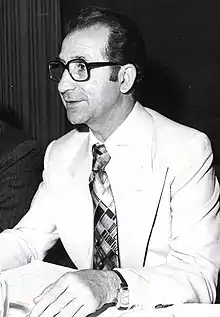Mehdi Samii
Mehdi Samii (Persian: مهدی سمیعی; 1918–2010) was an Iranian chartered accountant, banker and economist.[1] Samii is credited as "one of the chief architects of Iran's rapid economic and Industrial growth in the 1960s", as well as "a midwife of in the creation of the [Central] bank [of Iran]" and "more than anyone else responsible" for it.[1] According to Abbas Milani, "the fact that the bank was a relatively independent institution, free from corruption and political interference and unusually efficient", is attributed to his leadership.[1]
Mehdi Samii | |
|---|---|
 | |
| Ambassador-at-large and Advisor to the Prime Minister for International Financing | |
| In office 1971–1973 | |
| Prime Minister | Amir-Abbas Hoveyda |
| Governor of the Central Bank of Iran | |
| In office 1970–1971 | |
| Prime Minister | Amir-Abbas Hoveyda |
| Preceded by | Khodadad Farmanfarmaian |
| Succeeded by | Abdolali Jahanshahi |
| In office 1964–1969 | |
| Prime Minister | Hassan-Ali Mansur |
| Deputy | Khodadad Farmanfarmaian |
| Preceded by | Ali-Asghar Poorhomayoon |
| Succeeded by | Khodadad Farmanfarmaian |
| Head of Plan and Budget Organization of Iran | |
| In office 1969–1970 | |
| Prime Minister | Amir-Abbas Hoveyda |
| Preceded by | Mohammad-Safi Asfia |
| Succeeded by | Khodadad Farmanfarmaian |
| Personal details | |
| Born | 24 June 1918 Tehran, Qajar Iran |
| Died | 30 June 2010 (aged 92) Los Angeles, California, USA |
| Political party |
|
| Relatives | Fereydoun Mahdavi |
Biography
Samii was born in Tehran in 1910.[1][2] He held office as the Governor of the Central Bank of Iran (1964–1969; 1970–1971), the head of Plan and Budget Organization of Iran (1969–1971) and Ambassador-at-large (1971–1973).[1] Before that, Samii rejected job offers for ministerial roles twice: Once in 1960 when Jafar Sharif-Emami offered him the role of the minister of agriculture and the next in the following year when Ali Amini proposed that he become minister of commerce.[1]
He was a co-founder of Iranian Institute of Certified Accountants.[1] He died in 2010.[2]
References
- Milani, Abbas (2008). Eminent Persians: The Men and Women who Made Modern Iran, 1941-1979. Vol. 1. Syracuse, N.Y.: Syracuse University Press. pp. 760–767. ISBN 978-0815609070.
- Mehrzad Boroujerdi (2020). "Rethinking the Legacy of Intellectual-Statesmen in Iran". In Ramin Jahanbegloo (ed.). Mapping the Role of Intellectuals in Iranian Modern and Contemporary History. London: Lexington Books. p. 123. ISBN 978-1-7936-0007-3.